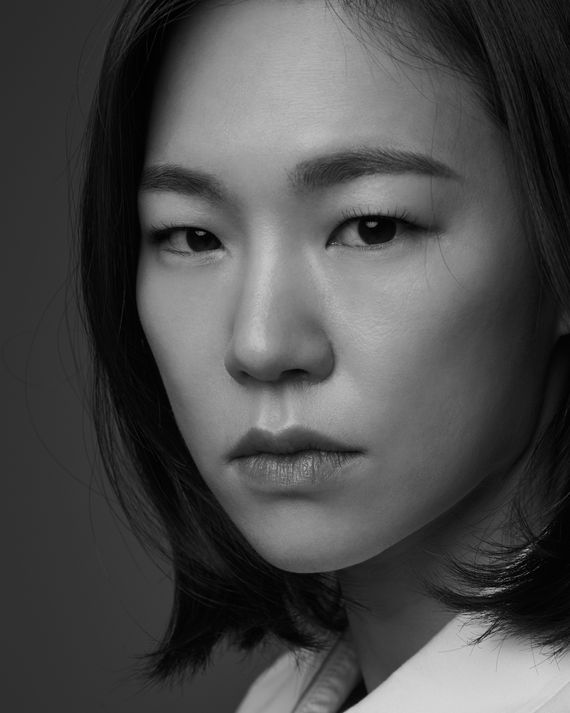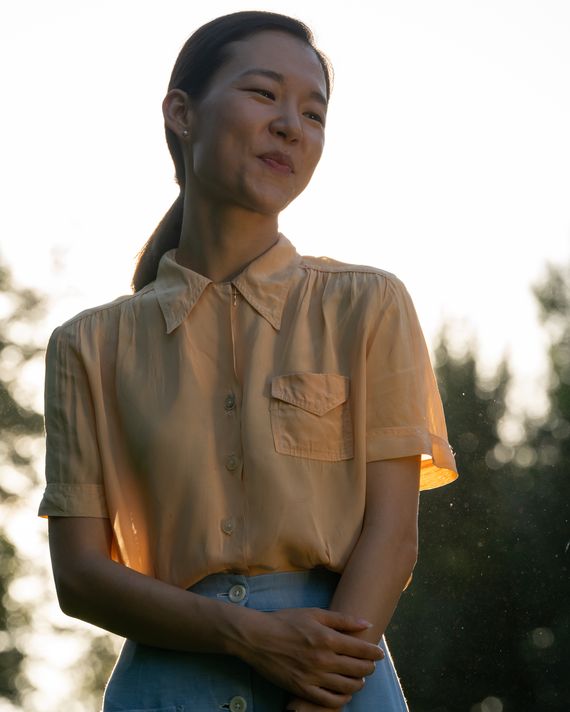
Minari opens with a shot of a young woman named Monica Yi, played by Yeri Han. It’s of her eyes, trained in a rearview mirror, and you see everything in them: the first seeds of skepticism, growing as she drives along a rural Arkansas road toward a home she’s never even seen in a country that’s still alien to her. The distaste for what she will later call “this hillbilly place,” so different from the city where she’s from. The anxiety, mostly for her children in the backseat, one of them with a heart condition that means he shouldn’t be this far from a hospital. The resentment — didn’t her husband think of that? The fear. The resolve. The love.
The shot is two seconds long, but maybe you’ll recognize it. I did — how familiar that look was, all it contained. How many times had I seen it on my own mother’s face? She would immigrate to America in the ’90s, some ten years after the events of Minari take place. Her American life would also begin in Arkansas, in a town called Fayetteville, where I would be born at the hands of a racist obstetrician.
Minari is Lee Isaac Chung’s semi-autobiographical film about a family of Korean immigrants who start a farm in 1980s Arkansas. It follows Jacob, played by Steven Yeun, who moves his two children and wife, Monica, into a mobile home on a bit of farmland to avoid a lifetime of chicken sexing. We watch Monica’s attitude toward him move from disbelief and exasperation into passive aggression. It’s a poor lid for her resentment, which still comes out in mean ways — slammed plates and tossed-off lines meant to sting. (“Would you live in a house like this when you’re married?”)
It all bubbles over early on, when Jacob casually accepts the news of an approaching tornado as his children cower under their mother’s arms. When this happens, you realize why Han was cast opposite Yeun, someone she goes toe-to-toe with easily and eclipses frequently. The tornado argument, which ends with Monica turning her back to Jacob and grabbing the tears out of her eyes with her fingers, is one of the moments you forget Yeun is supposed to be the star of the show. Han’s performance is even more striking when you learn that Chung wrote Monica’s character into the story only faintly; the beats were there, but Han drew the emotional arc herself, massaging Chung’s memories into the restrained, eloquent woman we see in Minari.
Like Monica, Yeri Han looks very young, but her age is completely indecipherable. This has something to do with the way she holds herself — even over a video call her bearing feels powerful, and her actual posture is so erect that she gives off an air of authority. As it turns out she’s 36, and has been a star in South Korea since her twenties when she began gathering awards for her work in a number of indie movies, films in which she played everything from a North Korean ping-pong player to a manipulative, cheating girlfriend. Minari — Han’s first film to premiere in the U.S. — came after her time on an episodic period drama and a sitcom. She is well-known for her range.
And yet, at first, Han struggled to figure Monica out. She shares very little with the character, and questioned why she stayed with Jacob, why she didn’t just take the kids and leave. It was only when she took a long, hard look at her own parents did she start answering some of those questions. Like Monica and Jacob, Han’s parents had her very young — “they formed a family before they could form a solid sense of self, or achieve their own dreams,” she says. With Monica’s naïveté established, Han let her use love as an excuse.
But it was her own mother, specifically, whom Han drew on, and it pays off in Minari’s most poignant scene, which takes place in a parking lot shortly after Jacob lands a partnership with a local Korean grocer. In early drafts of the script, Monica was to tell Jacob that she was leaving for good, but Han had Chung tweak the lines to be less damning.
“I thought Monica would never tell Jacob that she wants to actually leave him,” Han says, explaining that even at wit’s end her Monica was still full of love for Jacob, something we witness shortly after, when she runs after him into a burning building. “The memory was faint — it was just like a photograph in my mind — but I remember my own mother telling my dad something similar. The moment the words came out of my mouth, I thought about how my mother must have felt.”
It’s the only moment in the film Monica lets herself cry in front of her husband, and as Han describes it her perfect shoulders crumple slightly, and she herself begins to weep. She dabs her eyes and, recovering, goes on to describe how her mother was only one of many women she recalled for her performance. It was memories of her grandmother and six aunts, ultimately, that gave Monica everything you see in that rearview-mirror shot.
“When I think of their lives, I remember them as people who were repressing things,” she says of the women she grew up around, recalling how they prioritized their children’s education and aspirations, sacrificing their own ambitions in the process. It was a kind of altruism characteristic of the first generation of mothers in postwar Korea, Han says, but it was an attitude she could build into the immigrant parent she was playing, too.
And when you watch Minari with an eye toward Monica, it becomes a different film, one that knows the predicament of the immigrant mother and wife and is honest about it. Monica’s Minari is still grounded in love, but there’s a bitterness and a tension, borne of broken promises and misplaced expectations.
And that, I think, is where I saw my mother, where I didn’t expect to see her and where, at first, I didn’t want to. It’s one of those things where you avoid looking too hard because something tells you it will be too close.
If you’re a first-generation American, you may have felt this too, because Han gives us our mothers — their self-denial, their sacrifices, and their repression — and this makes Minari a more difficult film to watch. You leave it feeling more uneasy than if you saw the “gentle” and “intimate” immigrant story it has been described as because you have to ask yourself what becomes of Monica. Does she leave Arkansas and move to the city? Or does she stay, sexing chickens her entire life so her son can make movies? Is she ever happy?
Minari doesn’t answer those questions, and I don’t think it has to, largely thanks to Han. She knew our mothers’ sacrifices, but she also knew their strength. As she says to me later in the interview, “when I look back on the mothers I grew up around, I see them as very resilient and powerful people,” and so she gave Monica resilience and she gave her power. The distinction is everything; Monica’s Minari doesn’t just know about our mothers, it honors them.
Minari is available on demand today, February 26.




